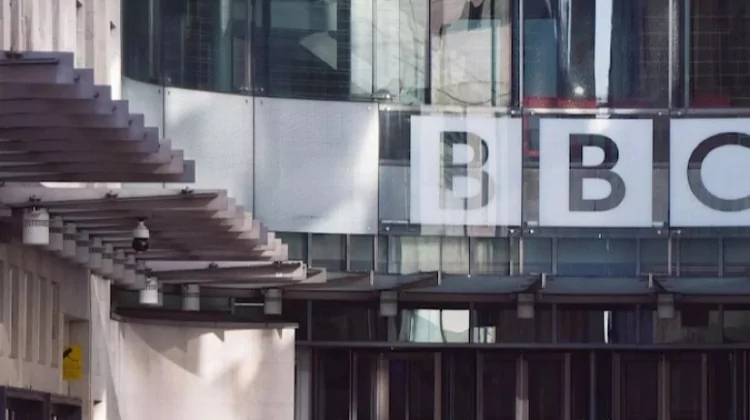
[Want even more content from FPM? Sign up for FPM+ to unlock exclusive series, virtual town-halls with our authors, and more—now for just $3.99/month. Click here to sign up.]
If the BBC’s coverage of Israel and the Palestinians is terrible, BBC Arabic Service is far worse. Now a short piece here spells out what some of its staff have been saying: “The Hitler sympathiser on the BBC,” by Nicole Lampert, Spiked, May 1, 2025:
BBC Arabic is the BBC’s most influential foreign-language service, reaching a weekly audience of 35million people. Ironically, taxpayers fund services such as BBC Arabic in order to flex the UK’s ‘soft power’ and spread our liberal values abroad – but this clearly is not what is actually happening here.
It’s not the “liberal values” of the UK that are being spread to those 35 million Arabic-language speakers who make up the BBC Arabic Service’s audience, but rather, admiration for Muslim terrorists that is shared by so many of the staff on the BBC Arabic Service.
The jubilation expressed by some of BBC Arabic’s senior staff over 7 October reveals the extent of the problem. Sally Nabil, a bilingual correspondent based in Egypt and the Middle East, liked a tweet that described the massacre as ‘Palestinian resistance taking the initiative and surprising the Israeli occupier with an operation of quality’. She also liked a comment that described a photo of jeeps loaded with bodies and kidnapped civilians as ‘a proud scene’.
Then we have Salma Khattab, a correspondent for BBC Arabic based in Egypt. Her response to the greatest slaughter of Jews since the Holocaust was to like a tweet describing the perpetrators as ‘freedom fighters’. Mahmoud Sheleib, a senior producer based in Cairo at the time of the 7 October pogrom, implied it was reasonable for Hamas to attack minors because Israel supposedly doesn’t ‘have any civilians among the youth’. ‘This is what the ignorant often don’t know’, he said on X. It tells us something important that none of these BBC employees seemed worried about their views becoming public, despite the Beeb’s clear rules on social-media use.
A comprehensive report by the Committee for Accuracy in Middle East Reporting and Analysis (CAMERA), published in March, reveals that this is not a new problem. In 2021, CAMERA notes, the BBC was forced to sack a West Bank-based reporter at its monitoring service when an old tweet that said ‘HitlerWasRight’ emerged. It found that BBC Arabic had also regularly hosted commentator Abdel Bari Atwan – a man who referred to a terrorist who killed Israelis as a ‘hero’ and expressed sympathy for Salman Rushdie’s attacker. He also said he would ‘dance with delight in Trafalgar Square’ if Iran attacked Israel. Where on Earth does the BBC find these people?
Conservative leader Kemi Badenoch has demanded ‘wholesale reform’ of BBC Arabic. In March, John Mann, the UK government’s independent adviser on anti-Semitism, said the BBC had repeatedly rejected his offers of anti-Semitism training. Yet none of this political pressure appears to have made the slightest difference at New Broadcasting House.The BBC ought to be ashamed of BBC Arabic’s conduct. The fact that it isn’t speaks volumes.
How should the government clean house at BBC Arabic? Replace the current head of the service with a non-Arab. Comb through the social media posts of the staff, both those in London and those in the Middle East, to discover who expressed antisemitic sentiments, such as the staff member who posted “Hitler Was Right” in 2021 and was summarily fired. Those who have expressed delight at the atrocities committed by Hamas on October 7, 2023, should also be let go.
Those who should be fired include Sally Nabil, Salma Khattab, Mahmoud Sheleib, and others. And then there are those who are not full-time staff, but brought on as regular commentators to share their views with the 35 million people who listen to the BBC Arabic Service. One such is Abdel Bari Atwan, who ought to be permanently banned from speaking on the BBC Arabic Service.
A thorough housecleaning of the BBC Arabic Service is needed. A dozen of its correspondents in the Middle East, and program producers in London, who have expressed their deep admiration for Hamas and their hatred of Israel, should be fired at once, with more firings to come as a BBC review board combs through past posts by staff members on social media. And who should replace them? What about hiring Arabic-speaking Europeans as correspondents based in the Middle East? And to replace the people who have been fired, Copts, Maronites, and Arabic-speaking Jews could be hired to broadcast from the BBC Arabic Service headquarters in London.
Aside from the newsasts, what about the regular programming? That, too, leaves much to be desired. Shouldn’t Israeli Jews from Arab lands, who have kept up their Arabic, be given a weekly program to describe their families’ lives in, and their flights from, Arab lands? Or a program conducted by Israeli Arabs that could provide 35 million other Arabs a view of what their lives are like in Israel, that would help dispel myths about that so-called “apartheid” state? Or programs devoted to “minorities in Arab lands,” including the Berbers, Kurds, Druze, Copts, Maronites, and Christians of other denominations? All manner of possibilities come to mind for what would be a new, and much improved, BBC Arabic Service.

















